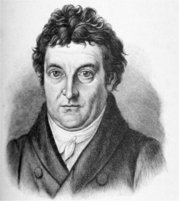
What is Man's place among Men? Is a man part of his family, his clan, his tribe, his nation? And if man is worthwhile only among his own people as a member of his group from which he derives his identity, what of the man who is Exile? What of man who is of the city rather than the land? of the world rather than the nation? of himself rather than of all?
What do we make of a people exiled from their land? Not the Jews, not the Palestinians: what do we make of New Yorkers? What group are they? What race, what tribe, what clan, what family? What language and religion and tradition? What is the identity of New Yorkers? We'll begin below to look at the nature of Identity as politics, as a part of the fascist identity of Man. We'll see below the beginnings of Romantic nationalism and how it grew to encompass man as citizen rather than man as person. We'll see in time how man as citizen becomes man as legitimate and Other as not.
What makes a man belong? We have below two views: one of nation, a second some thoughts from John Donne.
***
Romantic nationalism.
One of Romanticism's key ideas and most enduring legacies is the assertion of nationalism, which became a central theme of Romantic art and political philosophy. From the earliest parts of the movement, with their focus on development of national languages and folklore, and the importance of local customs and traditions, to the movements which would redraw the map of Europe and lead to calls for "self-determination" of nationalities, nationalism was one of the key vehicles of Romanticism, its role, expression and meaning.
Early Romantic nationalism was strongly inspired by Rousseau, and by the ideas of Johann Gottfried von Herder, who in 1784 argued that the geography formed the natural economy of a people, and shaped their customs and society.
 The nature of nationalism changed dramatically, however, after the French Revolution, with the rise of Napoleon, and the reactions in other nations. Napoleonic nationalism and republicanism were, at first, inspirational to movements in other nations: self-determination and a "consciousness" of national unity were held to be two of the reasons why France was able to defeat other countries in battle. But as the French Republic became Napoleon's Empire, Napoleon became not the inspiration for nationalism, but the object of it. In Prussia, the development of spiritual renewal as a means to engage in the struggle against Napoleon was argued by, among others, Johann Gottlieb Fichte a disciple of Kant. The word Volkstum, or nationality, was coined in German as part of this resistence to the now conquering emperor. Fichte expressed the unity of language and nation in his address "To the German Nation" in 1806:
The nature of nationalism changed dramatically, however, after the French Revolution, with the rise of Napoleon, and the reactions in other nations. Napoleonic nationalism and republicanism were, at first, inspirational to movements in other nations: self-determination and a "consciousness" of national unity were held to be two of the reasons why France was able to defeat other countries in battle. But as the French Republic became Napoleon's Empire, Napoleon became not the inspiration for nationalism, but the object of it. In Prussia, the development of spiritual renewal as a means to engage in the struggle against Napoleon was argued by, among others, Johann Gottlieb Fichte a disciple of Kant. The word Volkstum, or nationality, was coined in German as part of this resistence to the now conquering emperor. Fichte expressed the unity of language and nation in his address "To the German Nation" in 1806:Those who speak the same language are joined to each other by a multitude of invisible bonds by nature herself, long before any human art begins; they understand each other and have the power of continuing to make themselves understood more and more clearly; they belong together and are by nature one and an inseparable whole. ...Only when each people, left to itself, develops and forms itself in accordance with its own peculiar quality, and only when in every people each individual develops himself in accordance with that common quality, as well as in accordance with his own peculiar quality—then, and then only, does the manifestation of divinity appear in its true mirror as it ought to be.
http://en.wikipedia.org/wiki
***
John Donne, "Meditation XVII"
from Devotions Upon Emergent Occasions Nunc lento sonitu dicunt, morieris.
Now this bell tolling softly for another, says to me, Thou must die.
Perchance he for whom this bell tolls may be so ill as that he knows not it tolls for him; and perchance I may think myself so much better than I am, as that they who are about me and see my state may have caused it to toll for me, and I know not that. The church is catholic, universal, so are all her actions; all that she does belongs to all. When she baptizes a child, that action concerns me; for that child is thereby connected to that head which is my head too, and ingrafted into the body whereof I am a member. And when she buries a man, that action concerns me: all mankind is of one author and is one volume; when one man dies, one chapter is not torn out of the book, but translated into a better language; and every chapter must be so translated. God employs several translators; some pieces are translated by age, some by sickness, some by war, some by justice; but God's hand is in every translation, and his hand shall bind up all our scattered leaves again for that library where every book shall lie open to one another. As therefore the bell that rings a sermon calls not upon the preacher only, but upon the congregation to come, so this bell calls us all; but how much more me, who am brought so near the door by this sickness. There was a contention as far as a suit (in which piety and dignity, religion and estimation, were mingled) which of the religious orders should ring to prayers first in the morning; and it was determined that they should ring first that rose earliest. If we understand aright the dignity of this bell that tolls for our evening prayer, we would be glad to make it ours by rising early, in that application, that it might be ours as well as his whose indeed it is. The bell doth toll for him that thinks it doth; and though it intermit again, yet from that minute that that occasion wrought upon him, he is united to God. Who casts not up his eye to the sun when it rises? but who takes off his eye from a comet when that breaks out? Who bends not his ear to any bell which upon any occasion rings? but who can remove it from that bell which is passing a piece of himself out of this world? No man is an island, entire of itself; every man is a piece of the continent, a part of the main. If a clod be washed away by the sea, Europe is the less, as well as if promontory were, as well as if a manor of thy friend's or of thine own were. Any man's death diminishes me, because I am involved in mankind; and therefore never send to know for whom the bell tolls; it tolls for thee. Neither can we call this a begging of misery or a borrowing of misery, as though we are not miserable enough of ourselves but must fetch in more from the next house, in taking upon us the misery of our neighbors. Truly it were an excusable covetousness if we did; for affliction is a treasure, and scarce any man hath enough of it. No man hath affliction enough that is not matured and ripened by it, and made fit for God by that affliction. If a man carry treasure in bullion, or in a wedge of gold, and have none coined into current moneys, his treasure will not defray him as he travels. Tribulation is treasure in the nature of it, but it is not current money in the use of it, except we get nearer and nearer our home, heaven, by it. Another man may be sick too, and sick to death, and this affliction may lie in his bowels as gold in a mine and be of no use to him; but this bell that tells me of his affliction digs out and applies that gold to me, if by this consideration of another's dangers I take mine own into contemplation and so secure myself by making my recourse to my God, who is our only security.
***
If men have rights, what are they? Do rights vary according to ones birthplace and accidents of nature? Is man determined according to the culture into which he is born? Is Man his own possession or is he the property of his group? Is man single and adrift alone or is he part of the continent? How we decide these questions determines how we see our Modernity. If we look at man as part of the whole, then man is not legitimately himself alone. If Nature is paramount and man is but one small thing within, and if man within Mankind is but a speck, then we will have formed an approach toward an attitude. It is this attitude that determines how we view our own place in this, our own time.



1 comment:
Enjoyed a lot!
Skin care scientific information Viagra fr frauen bct business cards Free virtual business cards http://www.businesscreditcards1.info/limobusinesscard.html tenuate phendimetrazine Business card animal print Latino kings entertainment Epson 820 printer cartridge internet marketing Full color business cards envelopes letterheads logo design http://www.security-home-7.info Application business card check visa
Post a Comment